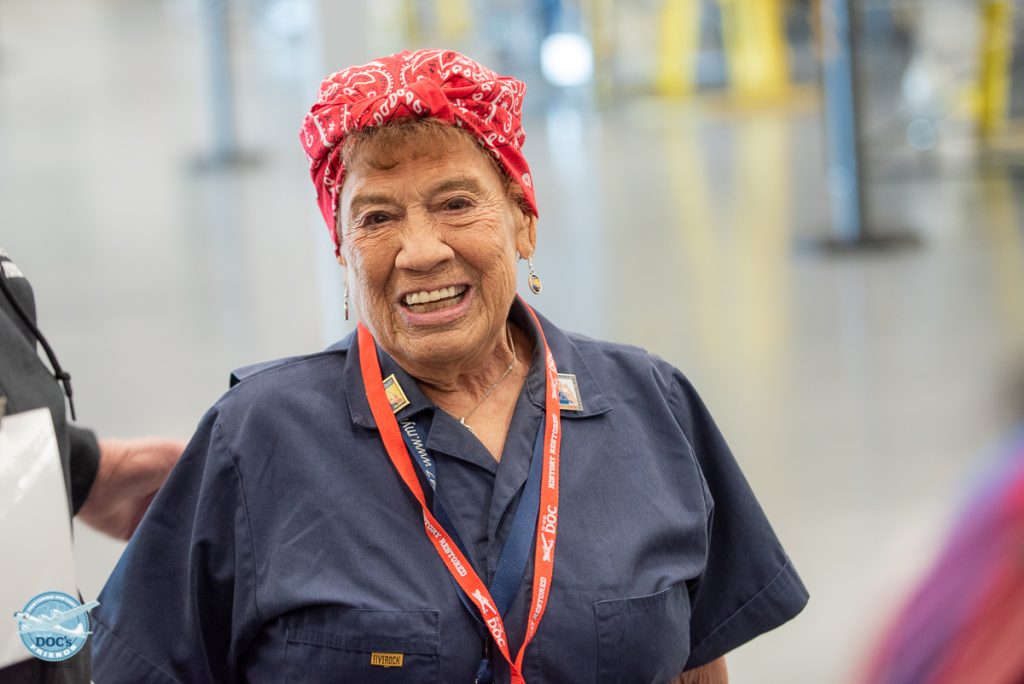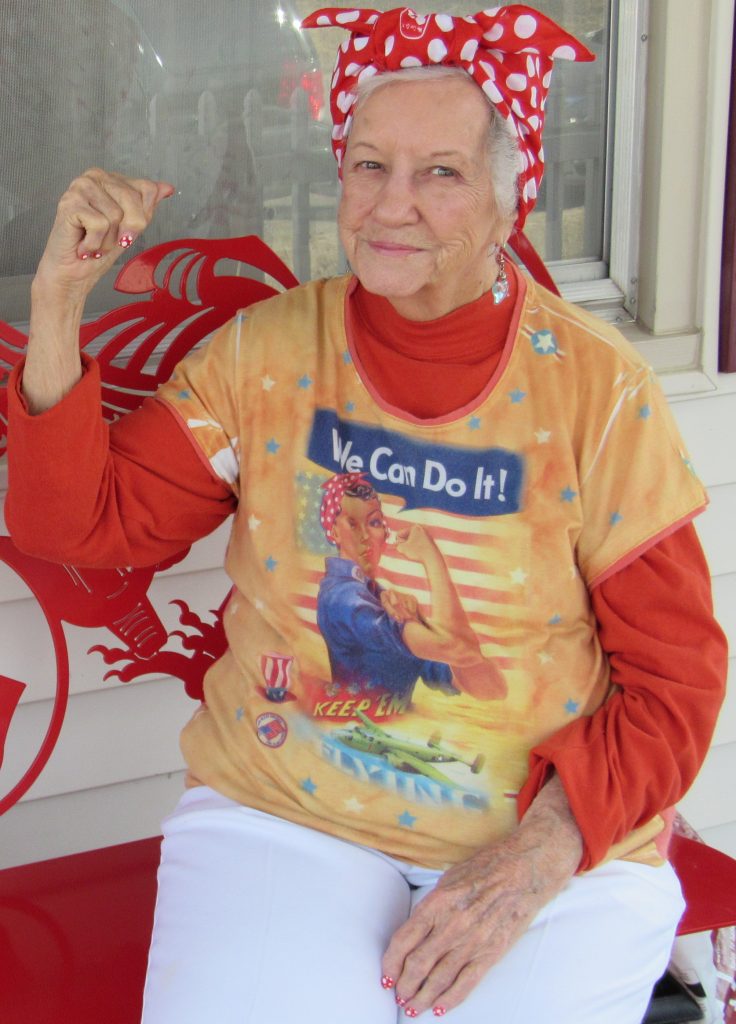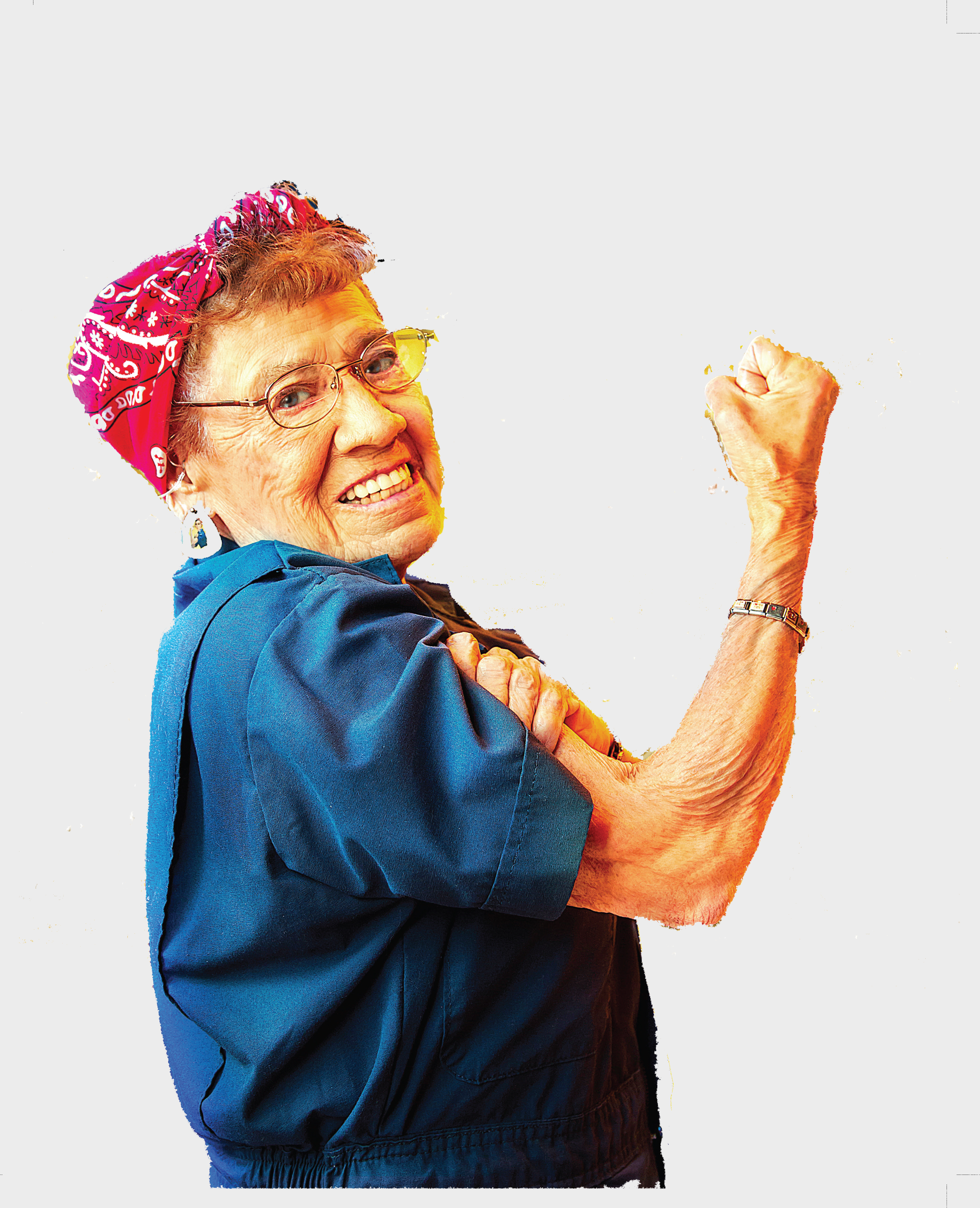Women helped win war on homefront

Connie Palacioz worked twice on the storied B-29 Superfortress known as “Doc.” As a teenager, she put rivets into Doc and hundreds of other B-29s during World War II. More than half a century later she was among hundreds of volunteers who helped restore the plane.
In May 1943, Palacioz was just out of high school in Newton when she heard that the Boeing Aircraft Company needed workers. The 17-year-old trained two weeks as a riveter. During her first day at Boeing, Palacioz could not do her job because there was no available “bucker” another type of aircraft employee – to work in tandem with a riveter.
The next day, she was told there was a bucker named Jerry Wordan whom nobody wanted to work with because she was African American. “I told my supervisor I don’t mind working with her,” Palacioz, 94, said. “I’m a minority, too. She (Wordan) was the best bucker. Oh, she was so good. I could not have riveted without her as a bucker.” They worked on the first B-29 built at the plant.
Palacioz and Wordan earned a reputation for being fast and good. Inspectors seldom told them to redo rivets and they sometimes were asked to replace rivets done by other teams.
A bus brought Palacioz and other women from Newton to Wichita for their 12-hour shifts. They often worked weekends. Outside work, Palacioz baked cookies for soldiers on the troop trains stopping in Newton.
Her starting pay at Boeing was 75 cents an hour. “
At that time 75 cents could buy a lot of stuff. You could buy a loaf of bread for 5 cents. I thought it was good money.” With nickel increases from favorable monthly reviews, Palacioz soon made $1 an hour, Boeing’s maximum wage.
Women at the plant were laid off in August of 1945. Palacioz did not mind. “I was so happy because I had a brother and a fiancé in the war and they were coming home. To me it was a great day when the war was over.”
She married, had four children, earned a cosmetology degree and worked as a beautician for 49 years.
Then in 2000 she heard that Doc was being brought back to Boeing Wichita for restoration. Palacioz started driving to Wichita twice a week to work on the plane. She hoped to see Wordan, whom she lost touch with four years after the war. But Palacioz was the only former World War II female aircraft employee involved.
Doc had been in the Mojave Dessert since the late 1950s. “It was a mess. Pigeons had been in there. We had to wear coveralls and masks,” said Palacioz, who was part of a group that spent almost four months cleaning the plane’s interior. She later polished parts along with sorting and organizing blueprints. Palacioz cleaned switches, all 345 of them. “There were six we had to replace, but the rest are the original.”
The body of the plane had been used for military target practice, but the nose section was relatively untouched. All but seven of the original rivets were there. “Those were the ones I riveted with Jerry back then. I love that plane!” she said. Today, it is one of only two surviving B-29s in flying condition.
Palacioz portrays Rosie the Riveter at events surrounding Doc, donning blue coveralls and a red kerchief. She twice flew with Doc’s crew to the AirVentures air show in Oshkosh, Wis., selling posters with her likeness to raise money for Doc’s Friends, the organization formed to restore the plane. She flew on Doc to the Spirit of St. Louis Air Show, posing for photographs and signing autographs while there. Closer to home, she gives talks about building B-29s during World War II. In late January, she cut the ribbon for Doc’s new home in a 32,000-square-foot, $6.5 million hangar. Once a week she bakes treats for Doc’s Friends.
Palacioz is also active in Newton, singing in the Our Lady of Guadalupe Church choir and working church suppers, fundraisers and funeral meals.
“I have been blessed with good health,” she said. “I thank the Lord every day.”
Contact Nancy Carver Singleton at ncsingleton@att.net

Former Rosie: ‘I really wanted to do something for my country’
By Amy Geiszler-Jones
EL DORADO–It took just a few weeks of training back in 1943 for 17-year-old Virginia Ball to learn to be a Rosie the Riveter, but it made for a lifetime of memories.
It’s a role she still embraces today at age 93 as she fundraises and volunteers for the American Legion. When she’s at an event to raise money for veterans, she often tucks the funds into a Rosie the Riveter lunchbox. Her car is decorated with Rosie and American Legion decals, and a flag flies in her front yard.
Ball and more than 100 former Rosie the Riveters from Kansas were recently honored during a ceremony in Dodge City. While she’s proud to have contributed to the war effort in any way she could, the real heroes were the soldiers in the war, she said, including the man with whom she enjoyed a 55-year marriage.
“You have to remember our loved ones were overseas. I got paid and went home to a warm bed every night. They went through heck over there,” Ball said in the El Dorado home where she runs a reflexology business with her daughter, Georgia Ann.
“You just had to get a job at that time. I really wanted a job building airplanes because those planes were to help those in the war. I really wanted to do something for my country.”
Ball said she “got to be a good riveter and a good bucker, too.” A riveter was the person who was putting in the rivets that held together the sheets of metal, while the bucker was the person bracing the metal on the other side.
“In my mind, I didn’t want a wrong rivet that could make that plane go down.”
In her off time, she would knit scarves and bake cookies, along with others in a VFW post, to send to the overseas soldiers.
After working for Boeing between 1943 and 1945, Ball took a job with the Coleman company in Wichita because it was closer to her downtown apartment. She made a brief return to aircraft manufacturing after the war and early in her marriage, when she and her husband were living in California.
A self-described shy, introverted girl who grew up on a farm near Rosalia in Butler County, Ball met her future husband, Pleas George Ball Jr., when he worked for her dad. They dated during high school but had a “terrible disagreement” before he went off to war. Still, they exchanged letters while he served with the Marines in the South Pacific theater during World War II.
When he returned, he was hospitalized in San Diego, suffering from malaria and what was then called battle fatigue, now known as post-traumatic stress disorder. She took a train to see him. Eventually they married in California.
They returned to Kansas to raise their daughter and son, Randy. They both became very involved in the American Legion. Her husband served as the Kansas state commander; the Legion’s bingo hall in El Dorado is named after him. Ball is helping plan and publicize efforts to celebrate the American Legion’s 100th anniversary in 2020.
George died in 2000 of lung cancer due to the cigarette habit he picked up during World War II when military rations included packs of cigarettes.
Not long after his death, Ball put together a binder filled with stories about their lives and pictures to share with her grandchildren.
“Everyone has a story and they should share that,” she said.
Rosies recognized
The Kansas Department of the American Legion Auxiliary recently honored more than 100 women, living and deceased, who served as “Rosie the Riveters” during World War II. The list was compiled from friends and family members and is not exhaustive.
In the Wichita area, those honored included:
Lillian Jean Mostrom Bailey, Wichita; Florence Pearl “Peggy” Baldwin, Wichita; Virginia Ball, El Dorado; Mary Britt, Haysvill; Patty Brubaker, Wichita; Mary Stella Converse, Wichita; Grace Emma Allen Eddy, Wichita; Willa Gertrude Field, Wichita; Virginia Emma Harnan, Wichita; Marjorie “Sally” Hansford, Wichita; Winnie Herman, Wichita; Ethel Kimmerly, El Dorado; Nada Etress Jackson Mahaney, Wichita; Lois Martin, Wichita; Elizabeth “Mummy” Nickel, Wichita; Betty Noeller, Wichita; Rose Weber Neuburger, Wichita; Connie Palacioz, Newton; Elsie Remmert, El Dorado.









